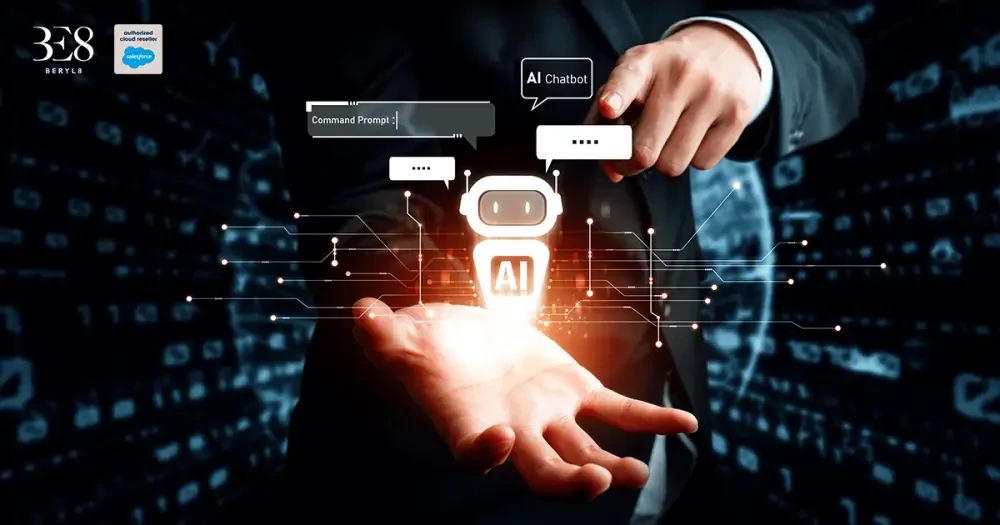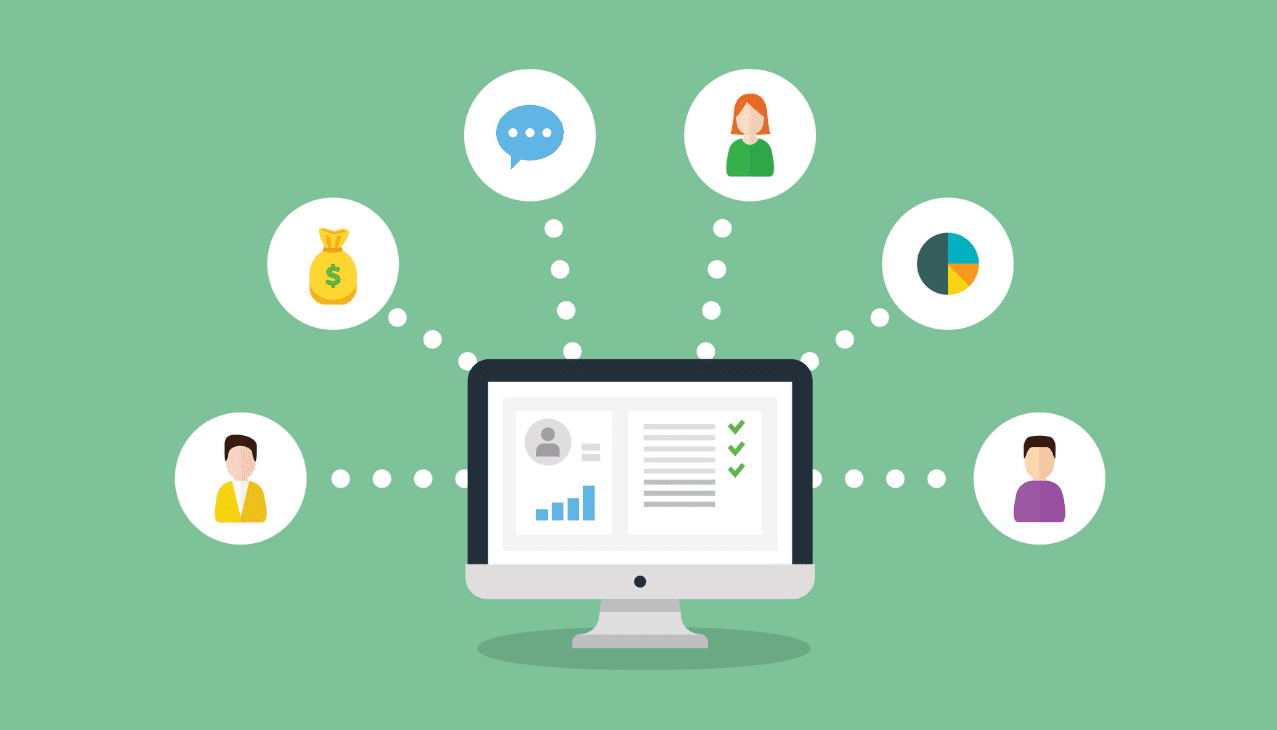3 Easy Steps to Pick the Best AI Chatbot for Your Business

AI chatbots aren’t one-size-fits-all - and there are a lot of options. Here’s what you need to know to choose the right one for your business.
Choosing the best AI chatbot for your business is an important part of getting the most out of artificial intelligence (AI). There are many chatbots on the market, and each is trained to excel at different things - Siri as your hand-held personal assistant, Einstein Copilot as your do-it-all digital employee, or ChatGPT as your human-like conversational partner.
An AI chatbot is a computer program designed to simulate human-like conversation through text or voice. In contrast to older rules-based chatbots, which have been around for decades, AI chatbots are created by training large language models (LLMs) on vast datasets of human conversations and knowledge, which helps the chatbot to understand natural language and generate relevant, contextual responses.
Here, you’ll discover how to clarify your needs, cut through the chatbot clutter, and find the best AI chatbot for the job.
The benefits of using AI chatbots
Thanks to AI chatbots, gone are the days of canned robotic responses, endless hold times, or making customers wait days for an email reply. Having always-on digital assistants available to deliver fast and personalized service is now the norm.
But chatbots don’t just benefit customers - they’re transformative for businesses, too. Every customer interaction is an opportunity for bots to uncover insights quickly and systematically, and potentially pinpoint ones you may have missed otherwise.
In an age where data is king, chatbots can collect and analyze conversational data from direct interactions with your customers. What are their biggest pain points? What questions keep coming up? With that knowledge, you can fine-tune your products and deliver even better service and support for your customers.
How to pick the best AI chatbot
With new chatbot options constantly hitting the market and offering varying specialties, it’s important to sort through the clutter and determine what is the best AI chatbot for your business. Understanding your specific needs, comparing costs, exploring customization options, utilizing your company’s existing data, and weighing functionality are all important factors to consider when deciding which AI chatbot to use.
To get started, consider these questions to pick the best AI chatbot for your business:
1. What are your goals?
There are specialized chatbots for everything from customer service to sales to marketing. So, the first step is to identify how a chatbot will help you accomplish your business goals. “What is the business outcome you want? For example, reduce cost, increase sales, or minimize customer service volume?” said Aron Kale, director of product management on the Salesforce AI team. “Getting really clear on what you want out of your chatbot is an important first step.”
For example, if providing better, more efficient customer service is your goal, prioritize chatbots that are adept at resolving common customer queries. Or, if automating repetitive internal tasks is the priority, look for chatbots that will integrate with existing systems and can handle multi-step workflows. If you’re focused on finding a solution to help increase sales and drive more conversions, find an AI assistant that can do things like make personalized customer recommendations and manage transactions.
A broader view is also beneficial to consider the ways an AI chatbot could make a bigger long-term impact. Are there downstream key performance indicators that your AI chatbot could affect?
For example, an HR chatbot could improve employee productivity and engagement by providing around-the-clock employee support, answering questions about company benefits, or sending automated reminders for project deadlines. A sales chatbot might boost conversion rates and lower customer acquisition costs by helping sales teams zero in on the highest-quality prospects. Or a customer service chatbot can improve satisfaction, loyalty, and retention metrics by providing personalized customer assistance.
Whatever your goals are, it’s important to understand the varied abilities of the different AI chatbot solutions on the market. Chatbots run the gamut, from those that are purely question-and-answer solutions to tools that can resolve issues independently from start to finish. Map out the ideal level of conversational complexity, task automation, language support, and human-AI interaction for your business.
2. Where does your data live?
One of the most important factors to consider when picking the best AI chatbot for your business is access to your data. How easily the tool can tap into your company’s own data can mean the difference between a richly personalized output and one that’s generic and unhelpful.
“Think about it in terms of what your human workers need in order to do their jobs well. Those are the same things your chatbot needs,” Kale explained. “So if you want your chatbot to focus on customer service issues, your chatbot needs to know your policies and look up an order status. Which you can pull in through tools like Data Cloud and MuleSoft.”
Think about the wealth of information contained in your company’s customer records, product information, service histories, internal policies, prospective customer data, and more. This data is a goldmine of insights, but it’s often spread across siloed databases, CRM software, conversation histories, and document repositories. Instead of giving generic responses, an AI chatbot that can access, understand, and seamlessly use this data can provide actionable answers that are specific to your business.
Let’s say that you run an online sports apparel store and a new customer asks the chatbot, “When will my order arrive?” A basic chatbot might reply with a standard line like “Orders typically ship in 3-5 business days.”
In contrast, a chatbot with access to your order management system would be able to respond in a much more personalized way: “Your order #913 for a Sacramento Kings jersey shipped yesterday via UPS. It’s expected to arrive this Thursday.” This kind of interaction goes a long way toward building brand loyalty, and the customer data needed to enable it likely already resides within your existing systems.
A data-connected chatbot can also work wonders for your HR team. A chatbot that can tell employees exactly how many vacation days they have left or explain retirement plans based on their personal file makes for a great employee experience. And in sales, it can recommend products that complement a customer’s past purchases. In short, an AI chatbot that connects seamlessly to your company data is a true expert in your business, not just a generic assistant.
When comparing chatbots, understand how different solutions connect to various data sources. Can it integrate with common systems like Salesforce, SAP, or Microsoft Dynamics? Does it support APIs to link to custom databases? How does it handle data security? The best chatbot for your business is the one that not only understands natural language, but also transforms your data into an important asset that can build lasting brand loyalty.
3. What resources do you need to get going?
As you evaluate different chatbot solutions, it’s important to have realistic expectations around technical expertise, budget, time to invest in learning, and what the AI can and can’t do right out of the box. How easy it is to integrate into your existing system should be a consideration.
For example, is it a low- or no-code option that needs minimal training to get up and running? What level of technical skill is required for customizations or updates? Are there additional costs for scaling or advanced functionality down the road? Getting a strong handle on the real human effort and total cost of ownership needed to get the most out of your chatbot is key.
Finally, consider what internal data your chatbot needs to be trained on to be effective across your marketing, service, sales, and IT teams. Uniting all your structured and unstructured data under one roof is the best way to get the most out of it, and making that data available through a conversational AI like Einstein Copilot can be a game changer for every facet of your business.
And if this big, exciting new world of AI is all a bit overwhelming, it’s important to know that you can start small and build up. “It’s really possible to start small and really simple, with things like Q&A and knowledge articles,” Kale said. “It doesn’t have to integrate to 50 things right away - you can add use cases and expand it to meet different use cases over time.”
The AI chatbot revolution
As natural language processing capabilities continue to advance, we can expect these virtual assistants to become even more humanlike and intuitive. The pace of AI innovation will continue to pick up speed, making now the best time to learn these tools, Kale said.
“The space is rapidly evolving. We’re seeing so much innovation, and businesses are seeing real value like never before,” he said. “It’s going to keep getting faster and faster, better and better. Start learning and getting hands-on now so that you’re well prepared as the technology evolves.”
For more information about our AI Chatbot, please contact our expert team by clicking here.



